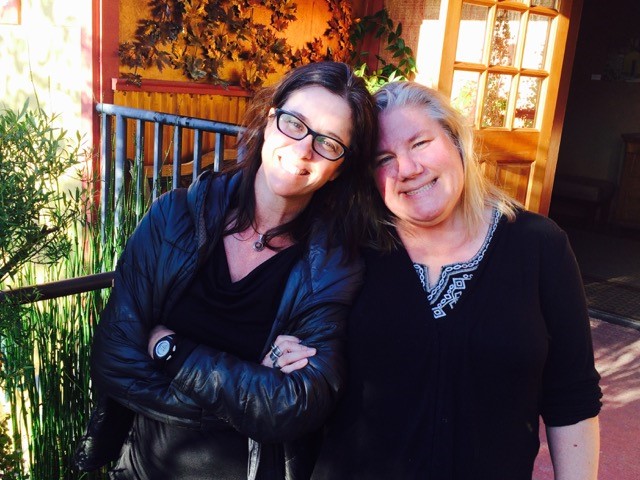
Julie and Emily are Coalition linchpins. Their consulting efforts have catapulted our work to the next level. Learn about how and why they are dedicated to the Coalition.
A little about you….
Where are you from, what are your hobbies, etc?
Julie: I’m a Canadian-born, Kent-raised north-westerner that feels lucky to call Seattle home. I love to hike, knit, play board games, see live theatre, and travel – all with my family, or my friends, or on my own. I try to blur the boundaries between work and play, because my work is about community and supporting organizations that are doing amazing work.
Emily: I’ve lived on Capitol Hill in Seattle for over 25 years now, but I am from Cape Cod and I’m lucky to still get to spend a lot of down time there with my family throughout the year. Which is nice because like most people I know, I seem to spend my life in Seattle somewhere between busy and mildly frantic, trying to cram in work, kids, volunteering, friends, and occasionally even a little exercise and sleep. I’m not always so successful at those last two, I must admit.
Can you tell us about your jobs? What do you like about it? What motivates you?
Emily: Julie and I work with small to midsized nonprofits, helping them do things they may not have done before, such as raise a lot more money in new way, create a game changing strategic plan, hire a new leader, or recruit and train a new board. I love what we do because we get to work with people who are entirely committed to whatever cause they are supporting, and I always learn so much about whatever issue that might be. I have huge respect for every client we work with, and it is exciting to help them be even more successful at realizing their mission.
Julie: What she said J
A little about you and the Coalition….
How did you get involved with the Coalition and/or domestic violence/sexual assault issues?
Emily: We originally were hired to help with fundraising, and a couple of years after that we helped create the strategic plan that eventually led to the recent name change. We also helped New Beginnings on a strategic plan, so we have thought a lot about these issues. But long before becoming a consultant I cared about the kind of issues the Coalition addresses. I worked on a rape crisis hotline in college, and I also worked a couple of years doing pregnancy options counseling at Planned Parenthood, hearing women’s stories firsthand. It was eye opening to say the least.
Julie: My earliest memories of getting involved with issues of domestic violence and sexual assault are probably not that dissimilar than for many of us – it was in my community growing up. I have vivid memories of a family in my neighborhood where abuse was happening and everyone knew about it. It wasn’t until the dog was abused that anyone did anything about it. As a social worker, I worked directly with survivors as part of my training. These very personal and first-hand experiences are still with me and motivate me to support the work being done by the Coalition.
How long have you been involved with the Coalition?
Emily: We started working with the Coalition in early 2011 – in fact, the Coalition was only our second client as a consulting team! It was a great experience and helped cement our partnership, which I’m very grateful for.
Julie: As consultants, we love getting to work with organizations over a long period of time in different capacities. 5 years and counting!
A little about what you think about the Coalition….
What is the most important role the Coalition plays in the community?
Julie: They are the only organization in our county that is mobilizing the myriad of organizations that are on the ground doing the work – helping to build political power, advocating for financial investment, and generally raising awareness so that we as a community are stronger, more compassionate, and more just.
Emily: One thing we hear in our work a lot is, “there are too many nonprofits!” That may or may not be true, but I do feel that when like-minded organizations coordinate efforts it can be very effective for creating change. That doesn’t “just happen”: it takes time, staff, communication and resources. The Coalition can play that role so that organizations, each with a different role to play, are aligned rather than competing. It’s a very powerful model.
What excites you most about the Coalition’s work?
Emily: I’ve realized this year that the name change is not just branding – for me it is a helpful reframe of how to think about the work itself and the root causes of violence. I’m still learning about how that shift will change the way we all think, talk, and address the violence in our world, but it is exciting to see the Coalition leading the way on this change.
Where do you see us going in the future?
Julie: I expect that the expanded mission will allow the Coalition to advocate at more of a root cause level, while still being an essential coordinator and supporter of all its member organizations. I believe we’ll see progress around fairer policies, increased investment in prevention and education, and greater hope and engagement across the entire community.
Why should other people want to get involved with the Coalition?
Julie: The Coalition is a smart investment of time and money because it helps all the member organizations do their work better – plus they are fun, kind, and very appreciative people, so every encounter you’ll have with them will feel great!
Emily: The people here are the best: smart, passionate, committed. It’s inspiring to feel part of that group.
If you would like to support the work of the Coalition here are a few ways you can.